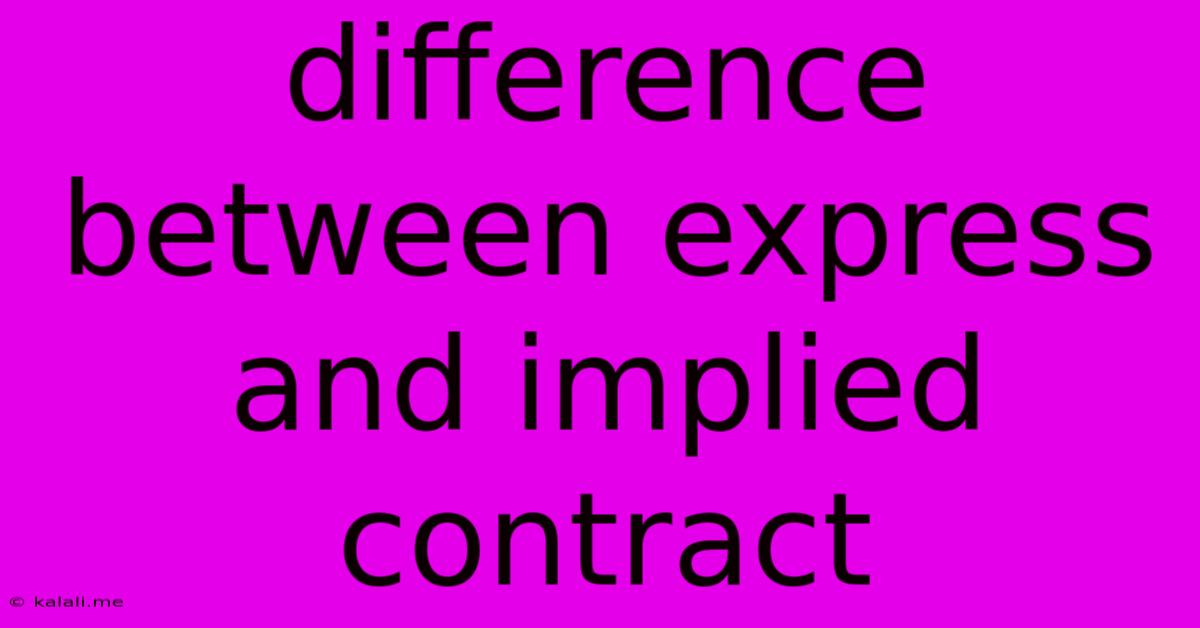Difference Between Express And Implied Contract
Kalali
Jun 13, 2025 · 3 min read

Table of Contents
Express vs. Implied Contracts: Understanding the Key Differences
Understanding the difference between express and implied contracts is crucial for anyone involved in business or legal matters. Both create legally binding agreements, but they differ significantly in how those agreements are formed. This article will delve into the specifics of each type, highlighting their key distinctions and providing real-world examples. Knowing the nuances can prevent misunderstandings and potential legal disputes.
What is a Contract?
Before differentiating between express and implied contracts, let's establish a baseline definition. A contract is a legally binding agreement between two or more parties that creates mutual obligations enforceable by law. These obligations can involve the exchange of goods, services, money, or a combination thereof. Key elements of a valid contract include offer, acceptance, consideration, intention to create legal relations, and capacity to contract.
Express Contracts: Clear and Explicit Agreements
An express contract is formed when the terms of the agreement are explicitly stated, either orally or in writing. This leaves little room for ambiguity or misunderstanding. The parties involved clearly articulate their intentions and the specific terms of the agreement.
Examples of Express Contracts:
- Written Contracts: These are the most common and reliable form of express contracts. Examples include employment contracts, sales contracts, rental agreements, and loan agreements. The detailed terms are documented in writing, providing a clear record of the agreement.
- Oral Contracts: While less ideal due to potential difficulties in proving the terms, oral contracts are still legally binding. A verbal agreement to purchase a used car, for example, could be considered an express contract if the key terms (price, vehicle description, delivery date) are clearly communicated and agreed upon.
Key Characteristics of Express Contracts:
- Explicit Terms: The terms are clearly stated and understood by both parties.
- Direct Communication: The agreement is reached through direct communication, either written or verbal.
- Easy to Prove (in writing): Written contracts provide strong evidence of the agreement's terms.
Implied Contracts: Agreements Based on Conduct and Circumstances
Unlike express contracts, implied contracts are not explicitly stated. Instead, they are inferred from the conduct of the parties involved and the surrounding circumstances. The agreement is implied based on the actions and behaviors of the parties, suggesting a mutual understanding of the terms.
Examples of Implied Contracts:
- Ordering Food at a Restaurant: When you order food at a restaurant, you implicitly agree to pay for the food upon consumption. No explicit contract exists, but the conduct implies an agreement.
- Hiring a Plumber: Hiring a plumber to fix a leaky pipe implies an agreement to pay for their services based on their standard rates or a pre-agreed price. The plumber's work implies an acceptance of the implied agreement.
- Continuing Employment: Continued employment after the initial contract expires can, in some circumstances, be interpreted as an implied contract, suggesting a continuation of the employment relationship under the same or similar terms.
Key Characteristics of Implied Contracts:
- Implied Terms: The terms are not explicitly stated but inferred from the actions and conduct of the parties.
- Circumstantial Evidence: The agreement is based on the circumstances and behavior surrounding the transaction.
- Can be Harder to Prove: Proving the existence and terms of an implied contract often relies on circumstantial evidence and interpretation.
Key Differences Summarized:
| Feature | Express Contract | Implied Contract |
|---|---|---|
| Formation | Explicitly stated (oral or written) | Inferred from conduct and circumstances |
| Terms | Clearly defined | Implied from actions and context |
| Evidence | Direct evidence (written or oral) | Circumstantial evidence |
| Proof | Relatively easier to prove | Can be more challenging to prove |
Conclusion:
Both express and implied contracts are legally binding agreements. Understanding the differences between them is essential for navigating business relationships and avoiding potential legal issues. While express contracts provide clarity through written or verbal agreements, implied contracts rely on the actions and context surrounding a transaction. Proper documentation and clear communication can help mitigate risks associated with both types of contracts. Consulting legal professionals is recommended when dealing with complex contractual situations.
Latest Posts
Latest Posts
-
Which One Of The Following Is A Pure Substance
Jun 14, 2025
-
What Is The Formula For The Intelligence Quotient
Jun 14, 2025
-
What Seismic Wave Travels The Fastest
Jun 14, 2025
-
What Is The Difference Between Physical Map And Political Map
Jun 14, 2025
-
What Is The Antonym Of Wise
Jun 14, 2025
Related Post
Thank you for visiting our website which covers about Difference Between Express And Implied Contract . We hope the information provided has been useful to you. Feel free to contact us if you have any questions or need further assistance. See you next time and don't miss to bookmark.